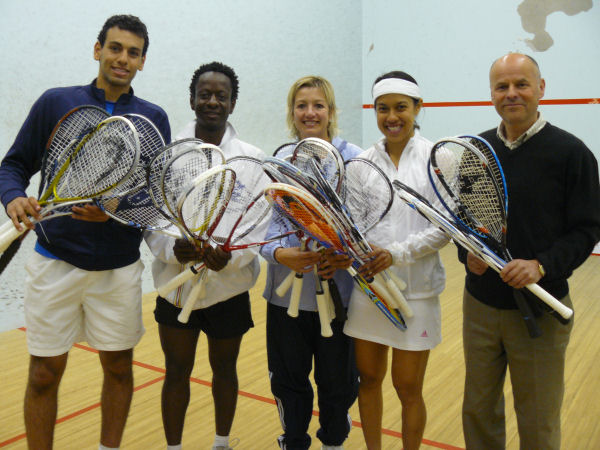London, June 22, 2012: A consignment of 50 squash rackets has arrived in the Namibia capital Windhoek for the Namibia Squash Association to use for development projects – heralding the start of deliveries for the Rackets For Africa project launched by the World Squash Federation earlier in the year.
It was Canadian Riley Waterous, a squash-playing student from Calgary, who conceived the idea of collecting used squash rackets to send to communities that could make use of them – leading to the birth of Rackets For Africa, an initiative supported jointly by the WSF and the African Squash Federation (SFA).
The Namibia package is one of several that are currently en-route to African nations, including Zimbabwe, Malawi, South Africa, Nigeria and Botswana.
“With more countries submitting development plans that can make use of a stock of rackets, further consignments will be on their way from Canada to Africa soon,” commented WSF Chief Executive Andrew Shelley.
“As part of the WSF Ambassadors Programme that only recently spent time with squash communities in both Malawi and Namibia – which coincided with the arrival of the rackets in Windhoek – we know just how challenging finding equipment can be,” added Shelley.
Adrianna Lambert, Chairwoman of the Namibian Squash Association, was excited about having a stock to link in with plans to expand opportunities in disadvantaged areas.
“We have schemes in place that will enable youngsters in new areas to try squash, and having a supply of rackets will make a real difference,” said Lambert. “This will be such a useful programme for us – and all over Africa, I am certain.”
Meanwhile Glenn Lazarus, another recipient on behalf of Central Gauteng in South Africa, will be using the rackets he has now received to provide equipment for his programme of training sessions every Wednesday and Thursday for high and primary schools and on Saturdays for social groups.
“There are 60 trained teacher coaches from the inner-city, Alex and Soweto, who train kids,” Lazarus explained. “We have more than 1500 kids from the inner-city and 500 from Soweto. We run ‘coach the coach’ and certified courses for our coaches as well as a monthly coaching forum to ensure there is continuity.”


Leave a Reply
You must be logged in to post a comment.